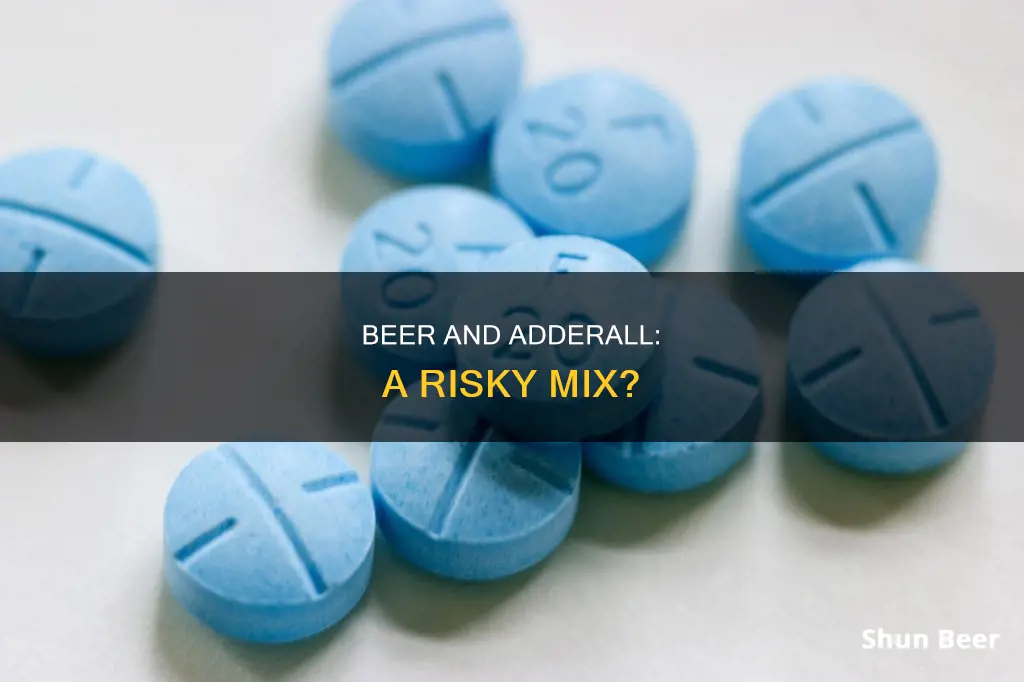
Mixing Adderall and alcohol can have dangerous side effects and lead to serious health complications. Adderall is a central nervous system stimulant that is often prescribed to treat attention-deficit hyperactivity disorder (ADHD) and narcolepsy. Alcohol, on the other hand, is a depressant that slows down the brain's electrical activity and has numerous effects on the body, including slurred speech, compromised motor skills, and impaired decision-making abilities. When taken together, Adderall can mask the effects of alcohol intoxication, making it easier for individuals to consume dangerous amounts of alcohol without realising it, increasing the risk of alcohol poisoning and even cardiac arrest.
| Characteristics | Values |
|---|---|
| Should you drink beer while on Adderall? | No |
| Why? | Dangerous side effects, including alcohol poisoning, heart attack, overdose, blackout, and more |
| Adderall's effect on alcohol consumption | Adderall masks the effects of alcohol, making it difficult to recognise how much alcohol is in the system, leading to unhealthy binge drinking |
| Who is most at risk? | Young adults and college students |
| How long after taking Adderall can you drink alcohol? | 4-6 hours for immediate-release Adderall, 8 hours for extended-release Adderall |
What You'll Learn
- Adderall and alcohol can cause an increased risk of heart attack and seizures
- Combining the two can lead to alcohol poisoning
- Adderall can mask the effects of alcohol, causing you to drink more than intended
- Mixing the two can cause an increased risk of substance abuse and experimenting with other drugs
- Adderall and alcohol can cause impaired judgement and decision-making

Adderall and alcohol can cause an increased risk of heart attack and seizures
Mixing Adderall and alcohol can have several dangerous side effects. The stimulant effects of Adderall can counter the sedating effects of alcohol, which may prompt a person to drink more. This can lead to an increased risk of alcohol poisoning, as well as heart-related problems, such as heart attacks, and even cardiac arrest.
Adderall is a central nervous system (CNS) stimulant that is used to treat attention-deficit hyperactivity disorder (ADHD) and narcolepsy. It is a combination of amphetamine and dextroamphetamine, which work together to control hyperactivity and impulses. Alcohol, on the other hand, is a depressant that slows down a person's bodily processes and affects the central nervous system. When taken together, Adderall can mask the sedative effects of alcohol, making it difficult for individuals to recognise the effects of alcohol in their system. This can lead to binge drinking, alcohol abuse, and an increased risk of blackouts, overdose, and other dangerous effects.
The combination of Adderall and alcohol can also cause other serious problems, including uncontrollable vomiting, loss of consciousness, and impaired judgment and decision-making abilities. Additionally, Adderall abuse can stifle a person's sense of intoxication and hangover, which can lead to a cycle of substance abuse and dependence.
The dangers of mixing Adderall and alcohol are even more pronounced in certain high-risk groups, such as older adults, women, and people with liver disease. Older adults, for example, break down alcohol slower than younger people, which can make interactions between alcohol and medications more likely. Women may also be at higher risk due to having lower body water levels than men, resulting in higher blood alcohol concentrations.
In summary, mixing Adderall and alcohol can cause an increased risk of heart attack and seizures, as well as other dangerous side effects. It is important to consult a doctor or pharmacist before consuming alcohol while taking Adderall to understand the unique risks based on health condition, age, weight, dosage, and other factors.
Recovering Alcoholics and NA Beer: Is It Safe?
You may want to see also

Combining the two can lead to alcohol poisoning
Combining alcohol and Adderall can have many dangerous effects on the body and mind. One of the most serious risks is alcohol poisoning.
Adderall is a central nervous system stimulant that is often prescribed to treat attention-deficit hyperactivity disorder (ADHD) and narcolepsy. It increases alertness, improves concentration, and reduces impulsivity. Alcohol, on the other hand, is a depressant that slows down the brain's electrical activity and bodily processes. When mixed, the stimulant effects of Adderall can mask the sedative effects of alcohol, making it harder for individuals to recognise how intoxicated they are. This can lead to binge drinking and alcohol abuse, increasing the risk of alcohol poisoning.
Alcohol poisoning occurs when blood alcohol levels become dangerously high, and it can be life-threatening. Adderall can delay the onset of the sedative effects of alcohol, making it easier for individuals to consume more alcohol than their body can handle. The stimulant effects of Adderall can also suppress the body's ability to recognise when it has had too much to drink, further increasing the risk of alcohol poisoning.
The combination of Adderall and alcohol can also lead to other serious problems, including uncontrollable vomiting, loss of consciousness, and cardiovascular issues such as elevated heart rate, chest pain, and heart attacks. The risk of these complications is especially high among older adults, women, and people with liver disease.
In summary, mixing Adderall and alcohol can be extremely dangerous and can lead to life-threatening situations, including alcohol poisoning. It is important to seek medical attention immediately if you or someone you know is experiencing any negative symptoms from combining these substances.
Beer and Kidney Stones: Post-Surgery Drinking Explored
You may want to see also

Adderall can mask the effects of alcohol, causing you to drink more than intended
Adderall is a central nervous system (CNS) stimulant that is FDA-approved to treat attention-deficit hyperactivity disorder (ADHD) and narcolepsy. Alcohol, on the other hand, is a depressant that slows down a person's bodily processes. When these two substances are combined, the stimulant effects of Adderall can counter the sedative effects of alcohol, making it difficult for individuals to recognise the effects of alcohol in their system. This can lead to binge drinking, alcohol abuse, and an increased risk of alcohol poisoning, overdose, and other dangerous effects.
The stimulant effects of Adderall can delay the onset of drowsiness and other signs of intoxication, causing individuals to drink more than they normally would. This increases the risk of alcohol poisoning, as individuals may continue drinking without realising they are already intoxicated. Additionally, the combination of Adderall and alcohol can lead to cardiovascular risks, impaired judgment, and mental health issues such as mood swings, aggression, and restlessness.
Young adults and college students are most commonly associated with the simultaneous use of Adderall and alcohol. A 2014 study found that 48.7% of high school seniors who recreationally used prescription stimulants, such as Adderall, had also used alcohol at least once within the past year. Mixing Adderall and alcohol can have many dangerous side effects, including an increased risk of alcohol poisoning, elevated heart rate, blackouts, and more. It is important to consult a doctor or pharmacist to determine how long after taking Adderall it is safe to consume alcohol.
Drinking and Driving: How Many Beers Are Too Many?
You may want to see also

Mixing the two can cause an increased risk of substance abuse and experimenting with other drugs
Mixing Adderall and alcohol can have many dangerous side effects. The stimulant effects of Adderall can mask the sedative effects of alcohol, which may prompt a person to drink more than they usually would. This can lead to unhealthy binge drinking, alcohol abuse, and an increased risk of blackouts, overdose, and other dangerous effects.
Research has shown that people who mix alcohol and Adderall seem to be at an increased risk of developing substance abuse problems and are more likely to experiment with other drugs. This is partly because Adderall can mask the effects of alcohol, causing an individual to believe that they must consume more alcohol to achieve the desired effects. This can lead to a dangerous cycle of use, where an individual engages with both substances regularly, leading to addiction and requiring professional treatment.
College students are one of the most at-risk groups for both excessive alcohol use and Adderall abuse. The stress of balancing school and a social life can lead many students to turn to Adderall as a way to excel at both. Some students view it as a "study drug", while others see it as a recreational drug and intentionally combine it with alcohol to party longer and drink more. According to the National Survey on Drug Use and Health, 90% of college students who use Adderall non-medically also reported binge drinking.
Mixing Adderall and alcohol can lead to serious complications, including alcohol poisoning, heart problems, uncontrollable vomiting, and loss of consciousness. It can also cause mental health issues such as mood swings, aggression, and restlessness. Therefore, it is important to seek help as soon as possible if a person starts to struggle with Adderall and alcohol abuse, as the dangers of addiction, including overdose, can have serious and sometimes fatal consequences.
Non-Alcoholic Beer: Safe Post-Pancreatitis Treat or Misstep?
You may want to see also

Adderall and alcohol can cause impaired judgement and decision-making
Adderall and alcohol can have a dangerous effect on a person's judgement and decision-making skills. This is because Adderall can mask the effects of alcohol, making it difficult for people to recognise how much alcohol they have consumed. This can lead to binge drinking, alcohol abuse, and an increased risk of blackouts, overdose, and other dangerous effects.
The stimulant effects of Adderall can counter the sedative effects of alcohol, which may prompt a person to drink more. This can lead to alcohol poisoning, which is where alcohol blood levels become so high that they are life-threatening.
Mixing alcohol and Adderall can also cause an increased risk of heart attack, seizures, and other cardiovascular events. This is because Adderall can cause an elevated heart rate and blood pressure, and when mixed with alcohol, this risk is heightened.
Young adults and college students are most commonly associated with the mixing of Adderall and alcohol. This can be extremely dangerous and can result in potentially fatal consequences.
Drinking Beer: Will One Bottle Put You in AKD?
You may want to see also
Frequently asked questions
No, it is not safe to mix Adderall and alcohol. This combination can be dangerous and lead to serious health complications, including alcohol poisoning and cardiovascular issues.
Adderall is a stimulant that can mask the effects of alcohol, leading to alcohol poisoning as individuals may drink more than intended without realising. Additionally, the combination can increase the risk of cardiovascular events and impair judgment and decision-making.
If you are concerned about any side effects or believe you may be experiencing an overdose, seek immediate medical attention by calling emergency services or contacting a poison control hotline.







